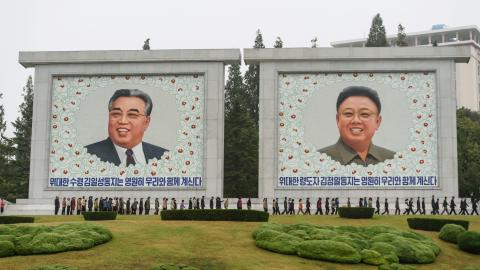Since the two Koreas were divided, life inside North Korea has remained largely shrouded in secrecy – the Kim regime’s use of its nuclear and missile weapons programs took center stage while the lives of the people took a backseat. In part this is because the weapons are visible, bombastically displayed by the regime to project power to the outside world. The people on the other hand, remain largely in obscurity, with only limited photos and videos of their plight readily available to the outside world.
A new documentary, Beyond Utopia, is changing that.
The film follows South Korean pastor, Sung-eun Kim, who devotes his life to what he believes is his God-given purpose of aiding North Koreans in their quest for freedom. The films follows the Roh’s, a North Korean family of five, attempting to escape the regime’s stronghold, and Soyeon Lee, a North Korean refugee mother determined to reunite with her son who remains in North Korea. The film is paradigm shifting as it gives the outside world a real-life glimpse into the difficulties of being North Korean.
I attended a screening of Beyond Utopia hosted at the Center for Strategic and International Studies prior to the film’s release to the public. As someone who has followed North Korean human rights issues for over a decade, I thought there was little that could shock me. I was wrong.
The regime’s human rights violations are well-documented, especially in the nearly 400-pages of the United Nations Commission of Inquiry report released in 2014 which detailed the regimes crimes against humanity. There are an estimated 80,000 to 120,000 individuals held inside North Korea’s modern-day gulags; women and girls are regularly subject to various forms of rape and sexual violence; food deprivation is the norm; and ordinary North Koreans don’t possess the freedoms that most people in democratic nations enjoy. As the UN report put it, North Korean human rights violations are “unparalleled” in the modern world.
You can hear those facts and statistics and understand the gravity. But it is another thing entirely to see videos of life inside North Korea and bear witness to an escape.
When you watch Beyond Utopia, you are not a mere consumer of entertainment, you feel as if you too are escaping a totalitarian regime.
When you meet the Roh family in the woods just on the other side of the North Korean border in China pleading for help, saying that they will die without the aid of Pastor Kim, their desperation is palpable. When they take the car ride across China to Vietnam, their fear of getting caught becomes your fear. When they make it to their first safehouse, you experience their relief. With every twist and turn through the Southeast Asian mountains, you hold your breath when a car goes by just as they do. When they cross the Mekong River from Laos to Thailand, you feel their fear of drowning. When they are on the boat to Thailand, the country they must make it to in order to get to safety in South Korea, you long for freedom as they long for freedom.
Audience members will have to see the film to know whether the Roh family makes it to safety. Not all stories, after all, have a happy ending.
North Korea expert Dr. Sue Mi Terry, one of the producers of Beyond Utopia, said:
“This is the first documentary to follow a North Korean family trying to escape to freedom on a dangerous and arduous trek through China, Laos, and Vietnam. This has the edge-of-your-seat immediacy of a first-rate thriller—but it’s all true.
Also, as a North Korea analyst at the CIA, I did many debriefings of defectors and I knew how the Underground Railroad for North Koreans worked in theory. But this was my first time seeing it in action.”
The film is being limitedly released to the public on October 23 and October 24. No matter your familiarity with North Korea, this film has something for everyone. It is a must-see documentary for anyone who cares about the cause of freedom.

















